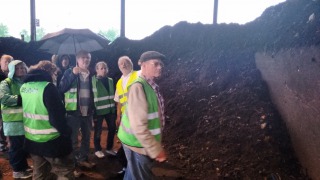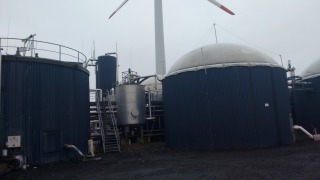On the 27th of August I took the opportunity to visit the Biogas and Composting facility of the EGW in Gescher, Germany, together with the colleagues of Transition Town (TT - Essen) and 2 mayor candidates for the 2015 mayor election in Essen.
I got a lift from a TT friend together with 3 other TT friends. While driving to Gescher we had good conversation about Biogas and Tamera
We arrived in Gescher at about 13:30 and went into their management building. It was raining, so coffee and shelter was very welcome during that time.
Kai Backeshoff from the EGW started with his presentation introducing us to the EGW and their work. He gave us a kickstart on what waste management means, what laws our waste and recycling systems are based on and what are their implications. He also showed us different types of waste and which waste bin we should throw them in. Actually we run into many question and answeres and straight from the beginning we had more a discussion going than just a presentation. This was highly appreaciated by all visitors.
Perhaps some facts: EGW is responsible for the waste of the county Borken, Germany. The EGW is owned completely by that county. It is responsible for all waste (about 400.000 waste bins), expect "Green point". I learned that the "Green point" (Grüne Punkt - Duales System) we have in Germany is something totaly different from the municipal waste system. The "Green point" is owned by a private company and consumer packaging nowadays always has a "Green point" licence - all packaging has it automatically.
After a discussion about recyling glass (which is better than one-time glass), recyling rare earth, and recyling paper (which is not possible that often) we went into the biogas & composting plant.
The EGW splits the bio waste into two parts by pressing of liquids which is later used in the biogas plant. The solid parts are used to build up compost. In order to build compost they use air or water to controle the temperature of the to be composted material. Due to legislation they need to get the smell down as much as possible. They use a bio filter that filters former acidified air. After 8 days (8 piles) the compost moves out of the composting plant.
The liquid parts get transfered to the biogas plant. Their plant is a continouse system that operates in different stages. First they get the bio degradable matter onto 35°C. The optimum of the methanogens. In the second stage they go up to 55°C, which is then held for some period of time - this stage is a legal demand onto the system, kind of sterilisation. The methan is stored at a huge flexible "ball". At the end of the process they create electricty and heat from the gas.
The EGW produces about 4 Million kW per Year from Biogas. I think that's an impressive number when we think that this is from bio waste and not from energy crop. This kind of systems - using food waste / bio waste - is the prefered way of producing biogas. There is no other or better way. Biogas from corn crops produces about 1 kW per hectar corn (PDF). Kind of inefficient. Time to build another IBC digester and use up some bio waste...


